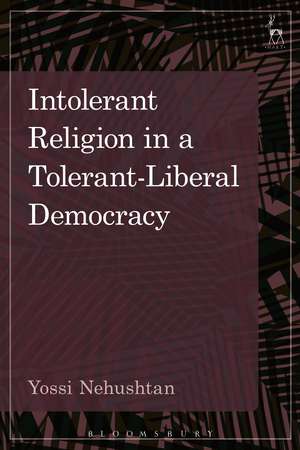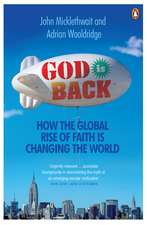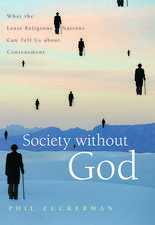Intolerant Religion in a Tolerant-Liberal Democracy
Autor Yossi Nehushtanen Limba Engleză Paperback – 24 ian 2018
| Toate formatele și edițiile | Preț | Express |
|---|---|---|
| Paperback (1) | 197.59 lei 6-8 săpt. | |
| Bloomsbury Publishing – 24 ian 2018 | 197.59 lei 6-8 săpt. | |
| Hardback (1) | 498.73 lei 6-8 săpt. | |
| Bloomsbury Publishing – 21 oct 2015 | 498.73 lei 6-8 săpt. |
Preț: 197.59 lei
Preț vechi: 257.78 lei
-23% Nou
Puncte Express: 296
Preț estimativ în valută:
37.81€ • 41.06$ • 31.76£
37.81€ • 41.06$ • 31.76£
Carte tipărită la comandă
Livrare economică 22 aprilie-06 mai
Preluare comenzi: 021 569.72.76
Specificații
ISBN-13: 9781509920082
ISBN-10: 1509920080
Pagini: 232
Dimensiuni: 156 x 234 mm
Greutate: 0.33 kg
Ediția:NIPPOD
Editura: Bloomsbury Publishing
Colecția Hart Publishing
Locul publicării:London, United Kingdom
ISBN-10: 1509920080
Pagini: 232
Dimensiuni: 156 x 234 mm
Greutate: 0.33 kg
Ediția:NIPPOD
Editura: Bloomsbury Publishing
Colecția Hart Publishing
Locul publicării:London, United Kingdom
Caracteristici
The author argues that illiberal intolerance should not be tolerated, that there are meaningful, unique links between religion and intolerance and that the religiosity of a legal claim is normally a reason not to accept that claim.
Notă biografică
Yossi Nehushtan is Senior Lecturer at the School of Law, Keele University, and Co-Director of the MA in Human Rights, Globalization and Justice.
Cuprins
1. Introduction 2. The Principle of Tolerance I. Introduction II. The Definition of Tolerance and the Right to be Tolerated III. The Components of Tolerance IV. Tolerance and Grudge V. Tolerance and Power VI. Conclusion 3. The Limits of Liberal Tolerance I. Introduction: Perfectionist Liberalism as a Starting Point II. The Limits of Tolerance: Reciprocity and Proportionality III. Who is the True Intolerant One? IV. Conclusion 4. A Tolerant-Liberal Democracy I. The Competing Political Theories II. The Case Against Neutrality III. A Pluralistic-Liberal State or a Tolerant-Liberal State? The Re-Establishment of Tolerance 5. The Theoretical and Empirical Links Between Religion and Intolerance I. Introduction II. The Empirical Findings III. The Theoretical Links Between Religion and Intolerance IV. Is the Co-Existence of Religion and Prejudice Paradoxical? V. Conclusion 6. Accommodating Religion by Granting Conscientious Exemptions: Is Religion Special? I. Accommodating Religion by Granting Conscientious Exemptions II. Conscientious Exemptions as an Expression of Tolerance III. Is Religion Special?: Five Possible Answers IV. Neutral Approaches V. 'Equal Regard' Approaches VI. Liberal Value-Based Approaches VII. Pro-Religion Approaches VIII. Anti-Religion Approaches IX. Conclusion: Is Religion Special? 7. Conclusion I. A Short Introduction to the Conclusion II. Why and when the Religiosity of a Claim for Accommodation or Exemption Matters III. And a Final Conclusion IV. Post-Conclusion: A Note about Religion, the Academic World and the Real World










